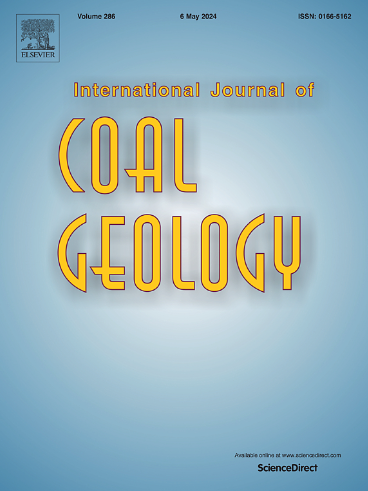样品制备对基于热解的未成熟油页岩有机物分析解释的影响
IF 5.6
2区 工程技术
Q2 ENERGY & FUELS
引用次数: 0
摘要
油页岩以及页岩油和页岩气是重要的能源资源,在世界各地都有巨大的储量。为了评估油页岩的石油潜力,人们采用了各种地球化学代用指标,并以各种方式对样本进行预处理,例如作为整块岩石或脱矿样本,或作为溶剂萃取的岩石/岩浆。因此,了解和量化预处理对地球化学参数的影响非常重要。在这项研究中,我们对以下几种样品进行了系统的比较:i) 整块岩石;ii) 提取的整块岩石;iii) 浓缩角质原;iv) 溶剂萃取脱矿页岩后提取的浓缩角质原。通过这种方法对来自德国诺尔德林格-里斯撞击坑中新世湖相沉积物的 7 个未成熟、富含有机质的样本进行了预处理,总共得到 28 个样本。对这些经过预处理的样品进行了一系列元素分析(C、H、N)、Rock-Eval 热解和居里点热解-气相色谱-质谱测量。除去矿物质后,总有机碳显著增加,热蒸发和热解裂解有机物(Rock-Eval S1 和 S2 峰)也显著增加。在某种程度上,用盐酸和氢氟酸去除矿物质可以破坏原始 S2 峰中的易变有机物,脱矿后 PI [S1/(S1 + S2)]值升高就说明了这一点。有机质类型更倾向于石油化,脱矿后氢指数(HI)和脂肪族值升高,而通常用作热成熟度参数的 Rock-Eval Tmax 值趋于降低,但并非所有样品都是如此。本文章由计算机程序翻译,如有差异,请以英文原文为准。
The effects of sample preparation on the interpretation of pyrolysis-based organic matter analysis in immature oil shale
Oil shale as well as shale oil and shale gas are significant energy resources with huge reserves present in different parts of the world. Various geochemical proxies have been applied to assess the petroleum potential of oil shales with samples pre-treated in various ways, e.g. as whole rock or demineralized sample or as solvent extracted rock/kerogen. In this respect, it is important to understand and quantify, how achieved geochemical parameters are influenced by pre-treatment. In this study, a systematic comparison is presented based on a study on i) whole rock, ii) extracted whole rock, iii) kerogen concentrate, and iv) extracted kerogen concentrate obtained after solvent extraction of demineralized shales. In total, seven immature, organic matter-rich samples from the Miocene lacustrine sediments of the Nördlinger Ries impact crater, Germany, were pretreated in this way leading to overall 28 samples. A set of elemental analysis (C, H, N), Rock-Eval pyrolysis, and Curie Point-pyrolysis–gas chromatography–mass spectrometry measurements were performed on these pretreated samples. Mineral matter removal leads to significant increase of total organic carbon, but also thermally evaporable and pyrolytically cracked organic matter (Rock-Eval S1 and S2 peaks). To some extent, labile organic matter represented in the original S2 peak can be destructed by mineral removal with hydrochloric and hydrofluoric acid, as shown by elevated values of PI [S1/(S1 + S2)] after demineralization. The organic matter type tends to be more petroleum-prone with raised hydrogen index (HI) and aliphaticity values after demineralization, while Rock-Eval Tmax values commonly applied as parameters for thermal maturity tend to decrease, though not for all samples.
Reduced TOC, S1, S2 and PI values of extracted samples suggest that both thermally evaporable and additionally some non-evaporable but soluble organic matter hidden in the original S2 peak can be lost after solvent extraction. Increased values of HI, H/C and N/C of extracted samples indicate more oil-prone organic matter types than unextracted samples. Typical maturity-related parameters such as aliphaticity and Rock-Eval Tmax decrease. Smectite and zeolites, which are abundant in the samples, are suggested to protect organic matter to some extent against solvent extraction, influencing a variety of geochemical proxies and the occurrence of metal cation-containing minerals. Zeolite invigorates the protection effect.
求助全文
通过发布文献求助,成功后即可免费获取论文全文。
去求助
来源期刊

International Journal of Coal Geology
工程技术-地球科学综合
CiteScore
11.00
自引率
14.30%
发文量
145
审稿时长
38 days
期刊介绍:
The International Journal of Coal Geology deals with fundamental and applied aspects of the geology and petrology of coal, oil/gas source rocks and shale gas resources. The journal aims to advance the exploration, exploitation and utilization of these resources, and to stimulate environmental awareness as well as advancement of engineering for effective resource management.
 求助内容:
求助内容: 应助结果提醒方式:
应助结果提醒方式:


